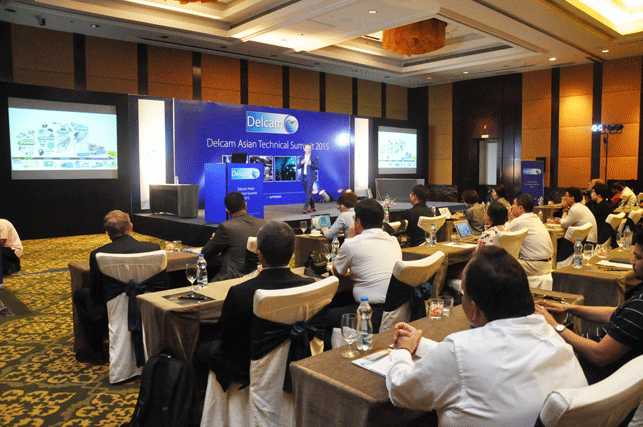The world of CNC machining may run on cutting-edge robotics, writes Stephen Holmes, but it’s up to CAM software vendors to provide the human touch that keeps customers happy
Software updates are a frustration for most of us. Returning home recently from a week spent away from my battered MacBook Pro, I opened its creaking spine to be greeted by a flurry of notification windows, all urging me to update some application or other.

CAM one, CAM all: attendees gather for Delcam’s Asian Technical Summit 2015, held at the Ritz Carlton Bengaluru in August
Having made a brew and settled down to watch my Mac’s spinning rainbow wheel of frustration, I realised that this is a process to which many of us, myself included, have grown accustomed. For the most part, we’re resigned to downloading updates and cracking on with whichever soulless task it is we’re undertaking. Should a download fail, we’ll attempt to troubleshoot the issue, re-download the software – and if it still doesn’t work, we’ll get a refund and try something else.
But this befuddled approach to dealing with software meltdown doesn’t quite cut it in industry. In business, time is money, as they say — and the higher the stakes, the more you need technology that works faultlessly or a team of experts on hand to fix it when it doesn’t. Support is everything.
That’s why it’s a worry to me to see CAD software slowly trundling towards the self-service check-out approach. Just like its supermarket counterpart, this could soon be a source of rage and despair, causing sane adults to swear like Glaswegian dockworkers at dumb hardware.
At least in a supermarket, a shop assistant with an override card will probably be along (eventually) to help get the process moving again. But in high-end machining — that most costly and time-reliant of businesses — customers need more than this. When you’re using software that controls a wide variety of extremely expensive CNC hardware, you’re going to want more professional, personalised service and support.
A question of trust
This is something I heard again and again during my time away in August at Delcam’s Asian Technical Summit in Bengaluru. Users from across Asia had a similar message to convey: the demands of CNC machining require a truly intimate relationship between CAM software vendors and their customers.
Each delegate, from companies as diverse as high-end jewellers and automotive OEMs, spoke highly of the level of support they receive from Delcam’s team in their homeland. They each knew their local support contacts by first name.
That kind of relationship is vital in the CAM industry, where vendors aren’t just handing you software. They’re selling a service and, as part of that service, a promise not to trash your investments in high-cost machinery.
Even a minor software error could mean big bills. After all, in order to break even on the initial investment made in CNC equipment, it’s often running continuously. Downtime simply isn’t an option. One botched cutting pass could set back an entire month’s worth of work.
In extreme cases, it may even be a matter of life and death. Given the scale of these machines and the uptake of 7-axis robotic arms in modern workshops and manufacturing plants, there’s a real risk to human life if something goes awry.
Selling confidence
In short, users want everything set up and working first time, every time – and if that’s not possible, they want a fast, reliable, informed response from the vendor. A solemn apology and a refund on the software package won’t cut it.
And from the customer perspective, screaming at a machine like it’s just asked for proof of age for a superglue purchase is even less fruitful.
This point becomes more important when you consider how software companies like Delcam are working to make their software easier to use for people who don’t have decades of experience.
You often get the impression that true masters of the metal-machining ‘dark arts’ are like old kung-fu masters, using extra sensory perception and transformative magic to get work done.
Trusting your arsenal of machinery to a young apprentice with less than a smidgen of that knowledge and expertise is another matter entirely — if you can even find one in the first place, given the current skills shortage.
It therefore falls to the CAM companies to make their simulation tools, which pre-prove all the cutting and drilling actions virtually, just as accurate as the real thing. They’re selling confidence and support to customers, just as much as they’re selling the lines of code that make up their software packages.
What CNC hardware users want is more professional, personalised service and support
Default






